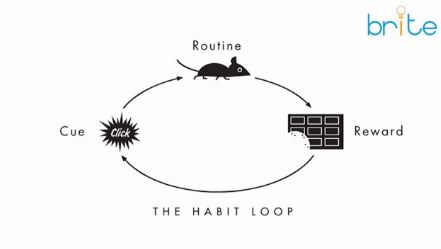 Have you considered how important habit is to just about everything you do -- including how you connect with customers and develop content?
Have you considered how important habit is to just about everything you do -- including how you connect with customers and develop content?
Think of it. A habit is about consistently repeating a behavior.
Consistency and repeatability create a recognizable pattern that sets expectations:
- A daily newspaper represents news freshly served every day.
- Regularly published blog content ideally follows a publishing schedule with set intervals.
- The work week represents a Monday through Friday schedule recognized globally as when businesses are open.
- Posted store hours of operation mean that the store can be counted on to be open on those specific days during those specific times.
Because of its consistency and repeatability, pattern means an increased opportunity for engagement, for connecting with potential customers. If the pattern is pleasurable or remarkable, it becomes a cycle of goodness and delight for your customers - encouraging them to form a habit around what your habit has created.
At BRITE'13, Charles Duhigg, author of The Power of Habit and Pulitzer Prize Winning Staff Writer at the New York Times, spoke to us about how effective consciously forming habits is for business.
At INBOUND13, habit came up as a means for ensuring effective inbound marketing. Charles Duhigg was specifically mentioned. Develop habits around creating content that focuses on customer personas, and you'll be successful delighting and connecting with customers. A content routine is the solution to finding enough time in the day; furthermore, a solidified routine leads to amazing creativity (think how a Jazz routine makes improvisation possible.)
Duhigg, in his BRITE13 presentation, differentiated between undifferentiated learning and habit based learning, which deliberately leads to new habits and routines. In the habit loop, you pair an activity with a reward to generate a new habit.
Cue --> routine --> reward
Click --> look --> chocolate
Habits impact clients/customers/employees.
Habits are easiest to change with major life events: birth, new job, house, or move and major business events: new role, job, management, or budget directives. That's when habits are most flexible. From a customer relationship perspective, that's the value of maintaining and building relationships over time so you are there when change happens. (From an inbound marketing perspective, this means staying in touch with regular and relevant communications to prospects and customers. Here's a great example of this mindset: Hugs or Relentless Customer Focus!)
Duhigg shared these two examples:
- Starbucks sells an experience/customer service. It noticed that, during an 8 hour shift, most workers were fine for the first 6 hours. After that, 10-15% fell apart and weren't able to handle customer service issues. The solution: teach employees willpower, make it into a habit using the habit loop. Will power, by the way, correlates with future success in life. Here is Starbucks' latte habit consists of: listen, acknolwedge, thank you, treat, explain.
- Target realized that newly pregnant women represented a business opportunity. If it could figure out who's pregnant, it could pro-actively share baby product coupons (i.e., a cue) and develop a new shopping pattern. Target analyzed shopper habits and discovered that buying vitamins, scent-free lotion, cotton balls and washclothes represented a pregnancy pattern. As a result, Target increased sales from $44B to $65B.
Here is a ~6 minute video from the BRITE13 session where Duhigg describes the Target example:
Apart from finding this fascinating, here's why I consider habits to be important for connecting with customers:
1. If you get into the habit of listening intensely to your customers, you'll be in better shape for creating content that they love.
2. If you are in the habit of regularly publishing blog content, you'll improve your ability to get found online.
3. If you develop a content habit, you'll be serious about publishing content regularly and you'll find ways to become more efficient by developing a content calendar, by being deliberate about the topics you write about and by ensuring that the content relates to your customers.
What's your experience with habits? Have you tried to develop new habits to help you better connect with customers? I'd love to hear more.








